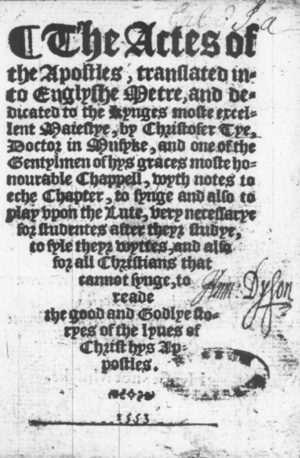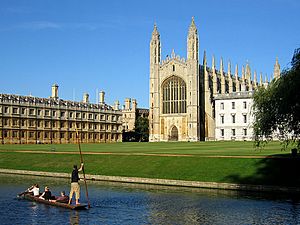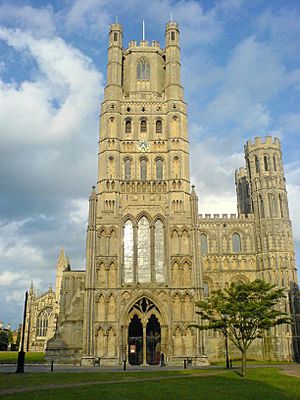Christopher Tye facts for kids
Christopher Tye (born around 1505 – died before 1573) was an important English composer and organist during the Renaissance period. He was probably born in Cambridgeshire, England. Tye studied music at the University of Cambridge. Later, he became the leader of the choir at Ely Cathedral.
Christopher Tye is famous for being the music teacher of Edward VI of England. People greatly admired his music for choirs. He also wrote chamber music, like his 24 In nomines, which used many different melodies at once (this is called polyphony). Sadly, most of his music has been lost. Only a small part of his work still exists today, often just as pieces. His book Acts of the Apostles was the only work published while he was alive.
He stopped composing music when he became a clergyman, which is a religious leader. He went back to Ely Cathedral. Later, he became the rector (a type of priest) in Doddington, Cambridgeshire. Today, many people know him for the hymn "Winchester Old". This tune comes from his Acts of the Apostles. It is used for the popular Christmas carol "While Shepherds Watched Their Flocks" in the United Kingdom.
Contents
Early Life and Training
Christopher Tye was likely born in Cambridge, England. We don't know much about his early life. The first time we hear about him is when he earned his Bachelor of Music degree. This happened at the University of Cambridge in 1536. Because of this, experts believe he was born around 1505.
In 1537, the year after he graduated, he started working. He became a lay clerk at King's College. A lay clerk was a singer who was not a priest. By 1543, he got a more important job. He became the Master of the Choristers at Ely Cathedral. This meant he was in charge of the choir boys. He earned ten English pounds a year for this job. Soon after, in 1545, the University of Cambridge gave Tye another degree. He became a Doctor of Music.
Working for the Royal Family
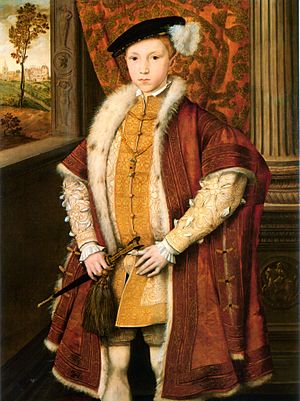
Christopher Tye had a strong connection with Dr. Richard Cox. Dr. Cox was a church reformer. He was also a teacher to Prince Edward. This connection was very important for Tye's life. Dr. Cox probably introduced Tye to the royal court.
It is believed that Tye became a music advisor to the royal family. He worked closely with Prince Edward. In 1605, Samuel Rowley wrote a play called When You See Me, You Know Me. Rowley was believed to be Tye's grandson. In the play, Tye and King Edward are important characters. Edward calls 'Doctor Tye' "Our music's lecturer." This shows how important Tye was to the young king.
In 1553, Christopher Tye published his only known work. It was called The Actes of the Apostles. In this work, he set parts of the Bible's book of 'Acts' to music. Some people liked it, and some didn't. But it was very important because it was dedicated to King Edward. In the introduction, Tye wrote about his friendship with the king. It is generally thought that Tye worked for the Chapel Royal Staff in the 1550s.
Religious Work
In 1558, Tye returned to his job at Ely Cathedral. His old friend, Richard Cox, likely asked him to come back. Soon after, Tye decided to become a clergyman. This meant he stopped composing music. Dr. Richard Cox was the bishop at Ely at this time. He made Tye a deacon and then a priest in the same year.
In 1561, Tye left his job at Ely. He was then given a position in Doddington, Cambridgeshire. This was the richest church position in England at the time. It is believed he died there before March 1573. That is when someone else was appointed to his position. However, there is no official record of his death.
His Music
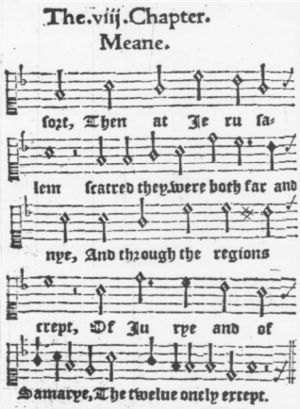
Christopher Tye was a leading court musician. He had strong Protestant beliefs. He is considered one of the most important English composers of his time. Even after he stopped composing and became a clergyman, his fame as a musician continued to grow.
Only one of Tye's works was published during his lifetime. This was Actes of the Apostles from 1553. It was a musical version of the Acts of the Apostles from the Bible. It was written for four voices. This work is not as highly praised as his other complex music. However, it contains his most famous piece. This is the tune used for the Christmas carol "While Shepherds Watched Their Flocks".
His surviving Latin choral works are mostly from the time of King Henry VIII. These include three full masses: the Peterhouse mass, a Westron Wynde mass, and a six-voice Missa Euge bone. Other surviving pieces include Quaesumus omnipotens et misericors Deus, Miserere mei, Deus, Omnes gentes, plaudite manibus, and Peccavimus cum patribus nostris.
Some of his works only exist in parts. For example, the anthem "To Father, Son and Holy Ghost" was missing a bass voice part. An editor named Vladimir Fedorov worked hard to rebuild it. Works like O God, be merciful unto us have been brought back to life.
His In Nomine pieces and other instrumental works for four or five parts still exist. These are some of the earliest examples of chamber music. Nigel Davison, a writer, believes that Tye must have written music for the organ too. He was a famous organist. But these works have probably been lost.
Images for kids
-
Clare College (left) and part of King's College, including King's College Chapel (centre)
-
Edward as Prince of Wales, 1546.
-
The "meane" of chapter VIII in Christopher Tye's Actes of the Apostles of 1553. The latter half was adapted and used as the tune of "Winchester Old".
See also
 In Spanish: Christopher Tye para niños
In Spanish: Christopher Tye para niños
 | Dorothy Vaughan |
 | Charles Henry Turner |
 | Hildrus Poindexter |
 | Henry Cecil McBay |


